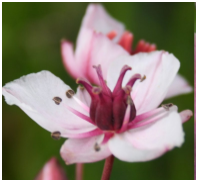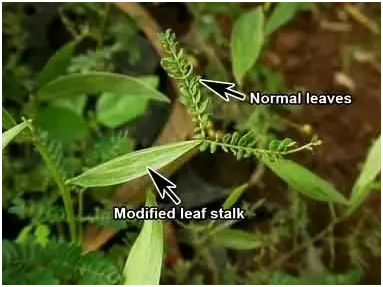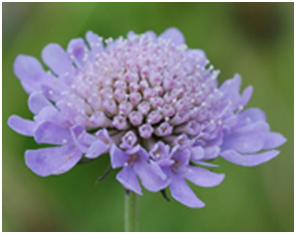Match each item in COLUMN I with one in COLUMN II and select the correct answer from the codes given:
COLUMN I
[Fruit name]
COLUMN II
[Edible part]
A.
Apple
a.
Juicy placental hair
B.
Guava
b.
Thalamus and pericarp
C.
Orange
c.
Fleshy thalamus
D.
Litchi
d.
Aril
Codes
A B C D
1. b c d a
2. b d a c
3. c b a d
4. d c b a
COLUMN I
[Fruit name]
COLUMN II
[Edible part]
A.
Apple
a.
Juicy placental hair
B.
Guava
b.
Thalamus and pericarp
C.
Orange
c.
Fleshy thalamus
D.
Litchi
d.
Aril
A B C D
1. b c d a
2. b d a c
3. c b a d
4. d c b a
Look closely at the gynoecium of the flower in the picture. The description of this gynoecium will be:

1. apocarpous monocarpellary
2. apocarpous multicarpellary
3. syncarpous monocarpellary
4. syncarpous multicarpellary
In Acacia, the modified leaf stalk shown are called as:

1. Phylloclade
2. Cladode
3. Phyllode
4. Hydathode
Leaf tendril shown in the picture can belong to:

1. Gloriosa
2. Opuntia
3. Ficus
4. Acacia
Match each item in COLUMN I with one in COLUMN II and select the correct answer from the codes given:
| COLUMN I [Modified tap root] |
COLUMN II [Example] |
||
| A. | Fusiform | a. | Radish |
| B. | Napiform | b. | Turnip |
| C. | Conical | c. | Carrot |
| D. | Tuberous | d. | 4’ O Clock plant |
Codes
| A | B | C | D | |
| 1. | a | b | c | d |
| 2. | b | a | d | c |
| 3. | c | d | a | b |
| 4. | d | c | b | a |
The type of inflorescence seen in the flower shown is called as:

1. Spadix
2. Corymb
3. Umbel
4. Capitulum
Match each item in COLUMN I with one in COLUMN II and select the correct answer from the codes given:
| COLUMN I [Modified adventitious root] |
COLUMN II [Example] |
||
| A. | Prop or stilt | a. | Betel |
| B. | Haustoria | b. | Orchids |
| C. | Epiphytic | c. | Dodder |
| D. | Climbing | d. | Banyan |
Codes
| A | B | C | D | |
| 1. | a | b | c | d |
| 2. | b | a | d | c |
| 3. | c | d | a | b |
| 4. | d | c | b | a |
The Great Banyan Tree is over 250 years old and covers about 14,500 square meters of land (3.5 acres) in the Acharya Jagadish Chandra Bose Botanical Garden near Kolkata (Calcutta), making it the widest tree in the world. From a distance, the tree has the appearance of a forest, but what appear to be individual trees are actually aerial roots- around 3,000 of them. These aerial roots are called:
| 1. Haustoria 2. Pneumatophores 3. Prop roots 4. Climbing roots |
 |
The flower shown in the picture is actinomorphic, with 3+3 tepals, 3+3 stamens and a superior ovary consisting of three fused carpels. This flower belongs to the family:
| 1. Liliaceae 2. Fabaceae 3. Solanaceae 4. Brassicaceae |
 |
The pointed structures seen emerging from ground in the given picture are called:
| 1. Pneumatophores 2. Haustoria 3. Assimilatory roots 4. Stilt roots |
 |






